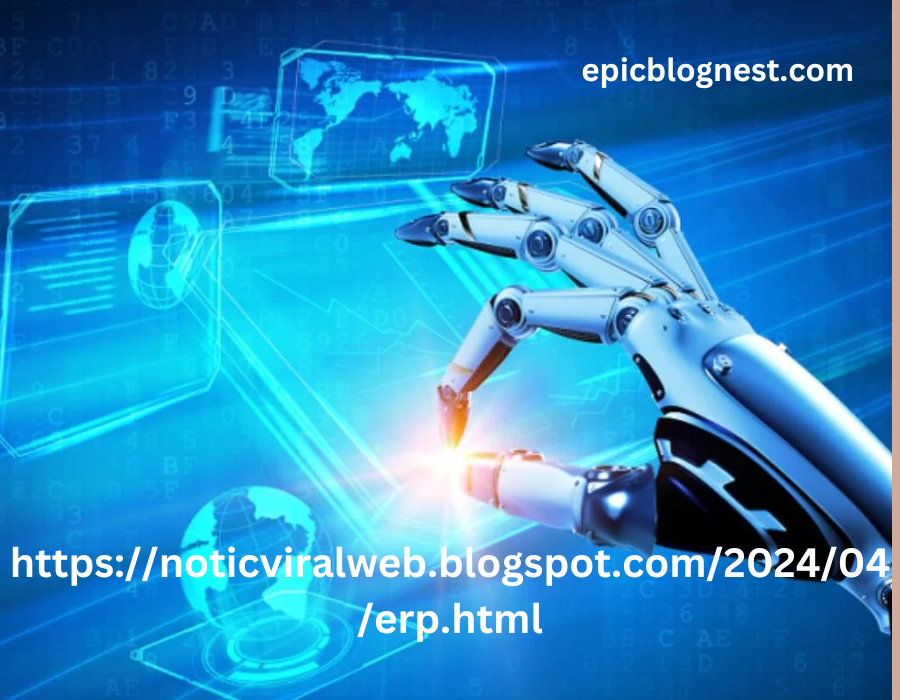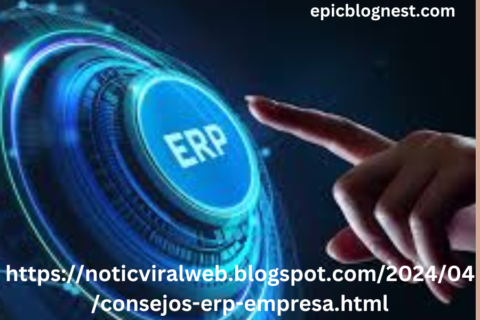Introduction
In the fast-paced world of modern business, companies must stay ahead of the curve to keep up with the competition. Efficiency, data-driven decision-making, and streamlined operations are no longer optional; they’re essential. Enter ERP(https://noticviralweb.blogspot.com/2024/04/erp.html), or Enterprise Resource Planning, which has become a cornerstone for companies looking to manage their business processes with greater precision. But what exactly is ERP, and why is it such a game-changer for organizations of all sizes? This guide will walk you through the ins and outs of ERP, shedding light on its benefits, components, and how it can transform your business from the inside out.
What is ERP?
At its core, ERP is a type of software that helps organizations manage and integrate important parts of their business. Picture this: an organization juggles multiple tasks such as accounting, human resources, inventory management, and customer service. Without a centralized system, things can get messy quickly—like trying to keep multiple plates spinning without dropping one. ERP comes in as the steady hand, consolidating these various functions into a single, cohesive system. This software integrates different business processes to facilitate the flow of information, eliminate data silos, and automate mundane tasks.
History and Evolution
ERP didn’t just appear overnight. Its roots trace back to the 1960s with the development of Material Requirements Planning (MRP) systems that were primarily used for inventory management and manufacturing scheduling. By the 1990s, these systems had grown more sophisticated, expanding into other areas of business and eventually becoming known as ERP. Since then, ERP systems have continued to evolve, especially with the advent of cloud technology, AI, and mobile accessibility, making them more flexible and adaptable for businesses of all shapes and sizes.
Key Components of ERP Systems
An ERP (https://noticviralweb.blogspot.com/2024/04/erp.html) system consists of various modules, each serving a specific business function. These modules are designed to integrate seamlessly with one another, providing a holistic view of the company’s operations.
Core Modules
- Finance and Accounting: The backbone of most ERP systems, this module handles everything from financial reporting to budget management, payroll, and invoicing. It ensures that financial data is accurate and accessible in real-time, enabling better cash flow management and compliance with financial regulations.
- Human Resources (HR): Managing employee records, payroll, performance reviews, and recruitment all fall under the HR module. By centralizing employee data, the HR module helps streamline operations and ensure that HR tasks are completed efficiently.
- Supply Chain Management: This module tracks the movement of goods, from raw materials to finished products. It helps optimize procurement processes, manage supplier relationships, and ensure timely delivery.
- Inventory Management: Inventory is the lifeblood of many businesses, and this module tracks stock levels, manages orders, and forecasts future inventory needs. It minimizes the risk of stockouts or overstocking by providing accurate data.
- Customer Relationship Management (CRM): This module focuses on managing interactions with current and prospective customers, providing insights into customer behaviors and helping to improve sales and customer service efforts.
Integration Capabilities
The power of ERP lies in its ability to bring different business functions together under one roof. By unifying various processes, ERP systems eliminate data silos, making information accessible across departments. Imagine being able to update inventory data, which instantly reflects in sales and finance reports. That’s the beauty of an integrated ERP system—it offers a “single source of truth” for all your business data, ensuring consistency and accuracy across the board.
Benefits of Implementing an ERP System
Adopting an ERP(https://noticviralweb.blogspot.com/2024/04/erp.html) system can transform your organization in more ways than one. Let’s break down some of the key benefits that make ERP worth considering.
Increased Efficiency
ERP systems streamline operations by automating repetitive tasks, reducing the amount of time employees spend on manual processes. Think about the time saved when data doesn’t have to be entered multiple times across different systems. Whether it’s generating reports or processing invoices, automation through ERP leads to quicker turnaround times and increased productivity.
Improved Data Management
In business, data is like gold. However, if that data is scattered across multiple systems, its value diminishes. ERP centralizes data storage, allowing for a comprehensive view of your company’s performance. This centralization supports more informed decision-making, as data from all departments is readily available for analysis.
Enhanced Reporting and Analytics
An often-overlooked benefit of ERP is its ability to generate detailed reports and analytics. With all your data in one place, ERP systems can provide insights into key performance indicators (KPIs), helping you track business performance and identify areas for improvement. Whether it’s sales trends, inventory turnover, or employee performance, you get a 360-degree view of your business.
Choosing the Right ERP System
Picking an ERP system is no small feat. It’s like choosing a business partner; you need to find one that aligns with your goals and can grow with you.
Assessing Business Needs
Before jumping on the ERP bandwagon, it’s essential to evaluate your company’s specific requirements. Are you looking to streamline financial processes, improve inventory management, or enhance customer service? Knowing what you need will help narrow down your choices and avoid paying for features you’ll never use.
Scalability and Flexibility
The ideal ERP system should be scalable to accommodate future growth. Your business isn’t static, and your ERP system shouldn’t be either. Ensure that the system can adapt to changes, whether it’s expanding operations, entering new markets, or evolving your business model.
Vendor Selection
Choosing the right vendor is just as important as selecting the right system. Reputation, customer support, and product updates should be part of your evaluation criteria. Don’t just settle for the first vendor that comes your way; do your homework and opt for one that has a solid track record and offers robust post-implementation support.
Implementation Process
Implementing an ERP system is like setting off on a road trip. You wouldn’t just jump in the car and drive; you’d plan your route, pack what you need, and make sure everyone is prepared. ERP implementation is no different—it requires careful planning and execution.
Planning and Strategy
The first step is to outline a strategy. This involves setting clear objectives, identifying key stakeholders, and establishing a timeline. It’s crucial to anticipate potential roadblocks and prepare a plan to address them, ensuring a smoother implementation.
Data Migration
Transferring existing data into a new ERP system is a significant step that should be handled with care. Data should be cleaned, standardized, and validated before migration to ensure accuracy. Taking shortcuts here can lead to data discrepancies that undermine the effectiveness of the new system.
Training Employees
An ERP system is only as good as the people using it. Training your employees to understand the system and use it effectively is vital for maximizing its benefits. Consider using a combination of training methods such as hands-on workshops, online tutorials, and ongoing support.
Common Challenges in ERP Implementation
No journey is without its bumps, and ERP implementation is no exception. Being aware of potential challenges can help you navigate them more effectively.
Resistance to Change
It’s natural for employees to feel hesitant about adopting a new system, especially if it changes how they’ve been doing things for years. Addressing concerns, offering training, and demonstrating the benefits of the new system can help ease this transition.
Integration Issues
Integrating a new ERP system with existing software can be tricky. Compatibility problems may arise, and data inconsistencies can occur. To avoid these issues, perform thorough testing and seek expert guidance during the integration process.
Cost Overruns
ERP projects can be expensive, and costs can spiral out of control if not managed properly. Establish a realistic budget, and factor in contingencies for unexpected expenses. Keeping a close eye on costs throughout the project will help prevent budget surprises.
Measuring Success Post-Implementation
After your ERP system is up and running, you’ll need to evaluate whether it’s meeting your business goals.
Key Performance Indicators (KPIs)
Establishing KPIs helps measure the effectiveness of the ERP system. Metrics might include the reduction in processing times, improvements in inventory turnover, or an increase in employee productivity. Tracking these metrics will show you whether the system is delivering a return on investment.
Continuous Improvement
Implementing an ERP isn’t a “set it and forget it” process. Regularly review system performance and user feedback to identify areas for improvement. Make necessary adjustments to ensure the system continues to meet your business needs over time.
Conclusion
Understanding ERP(https://noticviralweb.blogspot.com/2024/04/erp.html) and its potential impact on your organization is key to making informed decisions that will shape the future of your business. From boosting efficiency to improving data management, an ERP system offers a wealth of benefits that can transform your company. However, it’s not just about choosing a system; it’s about selecting the right one and implementing it correctly. When done right, ERP can be the catalyst that propels your business to new heights.
FAQs
What does ERP stand for?
ERP stands for Enterprise Resource Planning, which refers to software that integrates various business processes into a unified system.
How does ERP improve efficiency?
By automating repetitive tasks and centralizing data, ERP reduces manual workload and enhances the speed and accuracy of business processes.
Is ERP suitable for small businesses?
Yes, many ERP systems offer scalable solutions that can be tailored to the needs of small businesses, making them a valuable tool for growth.
What are some common ERP modules?
Common modules include finance, human resources, supply chain management, inventory, and customer relationship management.
How long does it take to implement an ERP system?
The implementation timeline can vary depending on the complexity of the system and the size of the organization, ranging from a few months to over a year.






